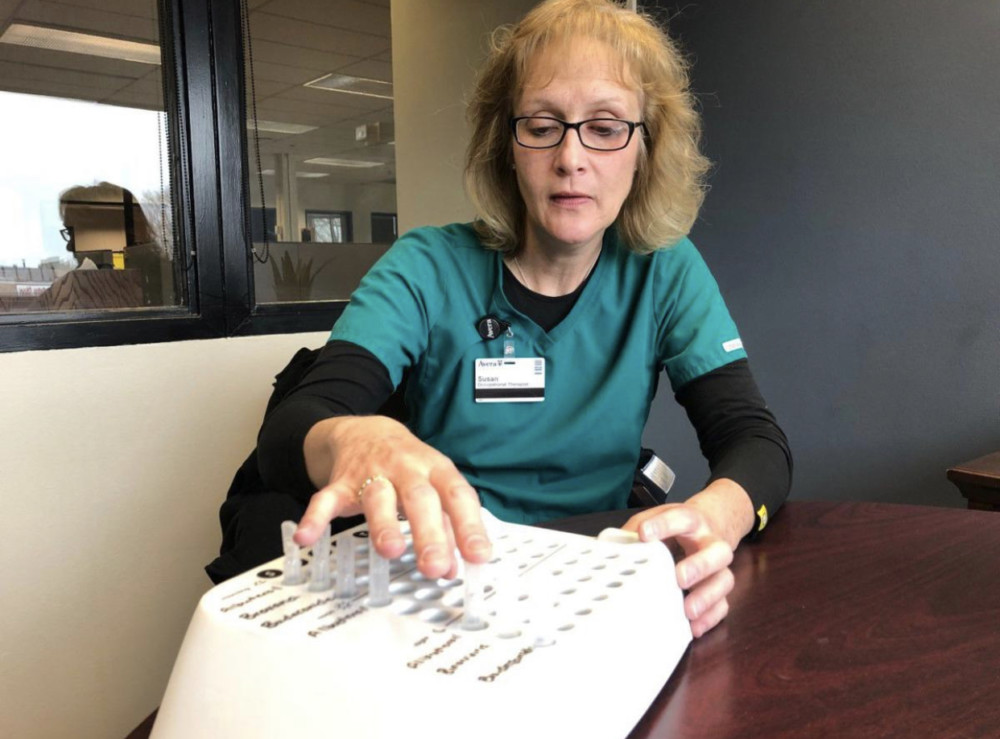By Erin Ballard
American News, Aberdeen, S.D.
WWR Article Summary (tl;dr) Susan Evan’s invention called “NebTrays” is set up much like a daily pill dispenser, but for nebulizer treatments. NebTrays is useful not only for people who forget to take their medication, but also those who lose track and take more than what’s necessary.
Aberdeen
If you asked Susan Evans even a year ago if she was Aberdeen’s newest inventor, she probably would’ve laughed.
But now, at 52, she’s well on her way to the next episode of Shark Tank.
Evans has worked as an occupational therapist at Avera St. Luke’s Hospital for 27 years, and in home health care for two decades. She’s spent a lot of face time with patients in their own homes, allowing her to get a paramount look at exactly what and where their struggles and needs are.
A major problem she and her team came back with frequently was patients’ inability to keep track of their nebulizer treatments.
“You try to brainstorm as a team, ‘What are we going to do for this patient to makes things easier for them?'” she said.
Thus, NebTrays was born.
NebTrays is set up much like a daily pill dispenser, but for nebulizer treatments. There are multiple rows on the tray for patients who need more than one kind of treatment, and each row has seven holes for each day of week.
When asked if they’ve taken their medicine, a patient’s answer is usually yes for oral medications, but more iffy for nebulizer treatments, Evans said. Usually, patients are given directions for their nebulizer prescriptions on the medication box, or they may rely on caregivers. But those methods have proven to be less than reliable.
“We get to their inhalers and their nebulizer treatments and it was hit and miss, and a lot of miss,” Evans said.
According to Evans’ research, about 16 million people have a Chronic Obstructive Pulmonary Disease and a third of that number uses nebulizers. Nebulizer medication can vary slightly in size, but each dose is contained in clear plastic vials. Evans said this makes it very easy to mix them up or forget whether one has been taken. She knows this firsthand, as her youngest daughter has asthma and relies on nebulizers to breathe more easily.
“You get kind of confused as to, ‘What did I just do?,'” she said. “I thought, ‘We have to try something different.'”
NebTrays is useful not only for people who forget to take their medication, but also those who lose track and take more than what’s necessary. Evans found this out through feedback during a trial period, which is currently underway. Some things she looks for is if a patient’s shortness of breath has changed after using NebTrays compared to before. These tests are imperative to creating a useful product, she said.
“The more data I can get back, the better,” she said. “I’d love to get going, but I want to get going with the right product.”
Evans first made a prototype out of a shoebox top, with some help from the nurses at Avera who deal with medication management and education.
When that proved successful, she took her design to a company in Minneapolis, which helped her come up with a prototype.
She then brought that back to Aberdeen businessman Travis Kiefer, who made 30 replicas for testing with local patients.
Earlier this year, Evans submitted NebTrays to the Giant Vision Business Plan Competition, which is hosted annually by the South Dakota Governor’s Office of Economic Development.
The competition encourages and supports business entrepreneurs in the state by offering cash prizes to finalists. On April 11, Evans and took third place for NebTrays and brought home $5,000 to help build the business.
“It’s pretty cool. The exit strategy would be to get this up and developed on the market, and the longterm would be to license the product or sell it to a big manufacturer that can get it everywhere,” she said. “Because respiratory diseases aren’t a North American problem, it’s worldwide.”
Beyond expansion in the market, Evans hopes to eventually make off-shoots of the NebTray, from electronic versions that notify caretakers when a treatment hasn’t been taken to travel-sized trays with lids. She hopes to have the first and standard NebTray available later this year.
“I’m pretty excited actually,” she said. “I’ve got a lot to learn but I have a phenomenal team of advisors. I would be nowhere without them.”
Evans hasn’t made a profit off NebTrays yet, and while that could happen in the future, she doesn’t expect it anytime soon. But her goal in creating NebTrays was never to make money.
“At the end of my days, if I can look back and say I made a difference in people’s lives, that is beyond rewarding,” she said. “I want to teach my daughters that it doesn’t matter what your age is or what’s going on in your life, you can still do good things for good people. I want to be a role model for them.”














































































































































































































































































































































































